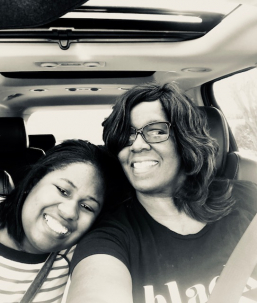
When Chyna was four years old, she was involved in a car crash with her grandmother. After being rushed to the hospital, doctors told Chyna’s mother, Zennia, that the injuries to her brain were very severe.
Seven days following her traumatic brain injury (TBI), the swelling on Chyna’s brain still hadn’t gone down, so they induced her into a coma. The injury also put pressure on her eyesight, so she was essentially blind. Finally, the doctors put a stint in her brain to relieve the immense pressure.
This all happened in 2001, Since then, Chyna has made strides in her recovery. Although her personality and cognitive functions were greatly altered by the injury, Zennia recounts the many different leaps in progress they experienced.
“I remember one day, we were watching TV, and I chuckled, followed by Chyna chuckling. I thought she was still blind, but I noticed her reacting to the program on the TV. I realized that she could see,” Zennia said.
Two months after the accident, Zennia fought to bring her daughter home to Chattanooga from a children’s hospital in Atlanta.
“Everything fell into place. I was a young mother, I didn’t understand the extent of Chyna’s TBI, and so many people helped me and walked with me through the beginning of it all. I was able to bring Chyna home on Mother’s Day, which was an incredible gift.”
Since Chyna’s return to home and school, Zennia has sat down with multiple teachers to explain the unique nature of Chyna’s injury and how it would affect her learning abilities.
“It’s not the teachers’ fault. Education on TBIs and other injuries needs to be a credential, but it’s not. We all have to come together and work together to find a solution.”
Because of this constant struggle, Zennia has become an avid advocate for resources and education around TBI, especially in the school system.
“I know Chyna’s not going to be the last child with a TBI coming through the system,” she said. “Support needs to be given to parents of students with TBIs as they come into the schools.”
Today, Chyna is a thriving young adult, which is a much different outcome than what Zennia expected.
“The doctors told me I would always have to take care of her, and that I should plan on someone having to take care of her during her whole life.”
It was Chyna’s stepfather who encouraged her independence. He started with basic chores around the house, giving incentives and consequences to Chyna if she didn’t complete these tasks, such as taking out the trash or feeding the dog.
“Starting when Chyna was about 17 years old, both her father and I noticed she could do things on her own, so we pushed her towards more independence and responsibility. Now, I don’t worry about who’s going to take care of her as much.”
Zennia is currently trying to encourage Chyna to be as independent as possible. She’s helped Chyna learn the importance of voting and of being involved as an advocate in her country. Chyna will go through the Partners in Policymaking program soon to learn how to effectively speak with legislators and speak up for hers and others’ needs.
Looking back, Zennia has a few words of advice for parents whose children have just experienced a TBI and are navigating the new recovery process, “I felt so alone and like no one understood her. Don’t be afraid; always celebrate your child.”